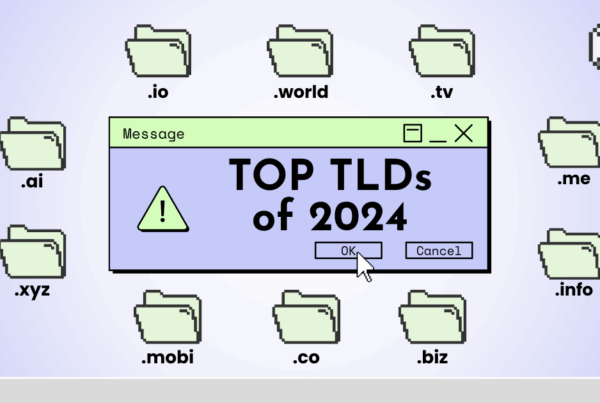Despite the roller coaster of a year we’ve had in the tech industry, we can all agree that tech isn’t going anywhere.
People and companies continue to innovate new products or software to (hopefully) make life easier and improve business productivity. This is especially evident with the surge of AI, catalyzed by OpenAI with ChatGPT.
If you fall into that category of “people innovating new products or software,” you might be considering where to platform your ingenious conceptions. While there are a plethora of platforms to use for funding, marketing and networking, having your own dedicated website is still the best way to create a centralized hub to track all commerce and collaboration.
But what if your desired domain isn’t available in .com? What do you do?
Lucky for you, tech’s rapid expansion has resulted in the popularization of new domain extensions (or TLDs). Here are the domains you should consider for your new tech business.
Most Popular TLDs in the Tech Space
Choosing the right TLD can be just as important as choosing the right domain name.
While there are plenty of options outside of .com, each TLD serves a purpose. Similar to how .org is most popular for charities or non-profit organizations, .net is a popular choice for networking or internet service businesses and .edu is for school and post-secondary institutions.
Tech websites operate in the same vein, so you need to be sure you choose the best one that fits your product or brand. Here are the best options.
.io
We’ve all seen .io grow in popularity over the past several years. And that’s thanks to the boom of the tech industry over the past decade.
One of the more common TLDs tech startups flock to is .io.
Why? A big reason the tech community favors .io is because I/O is frequently used in computer science to mean input/output.
It’s also gained popularity due to the number of words that end with “io”, like postach.io, aud.io and mustach.io (which surprisingly is for sale on DomainSpot for $1,500 right now!) and the countless words that sound catchy with “io” added at the end, like frame.io.
Along with tech startups, .io is most commonly associated with:
- Browser games: itch.io, agar.io and webgames.io
- APIs (Application Programming Interface): polygon.io’s stock market API and agify.io’s hilarious age-predictor API
- Open source projects: intelx.io, baserow.io and gdevelop.io
- And more: synthesia.io’s text-to-video generator, hackr.io’s online courses for learning tech skills and gofile.io’s all-in-one storage management.
If your tech business falls into any of the aforementioned categories, see if your domain is available in .io!
.tech
Another go-to domain extension for the tech industry is .tech.
What makes .tech so appealing is it’s the perfect all-encompassing technology TLD. There are no sub-niches in the tech space that .tech caters to.
To some, it’s also more attractive than .technology due to .tech having only four letters, making it much easier to type and memorize. (Not to mention that if you’re considering using email from a matching domain name, brevity is always preferred!)
Another quality of .tech is that it’s appropriate for any and all companies. It’s used by large corporations and startups alike, as well as tech-adjacent industries. Here are a few companies that use .tech:
- Large corporations: paramount.tech and intel.tech
- Startups: aurora.tech’s self-driving technology and soar.tech’s white-label digital banking platform
- Tech-adjacent: getinto.tech’s and workat.tech’s websites dedicated to educating everyone on tech and helping them land jobs in the space
.tech is a well-trusted and established TLD that makes you instantly recognizable in the tech field. Find out if .tech is available for your brand!
.ai
It wouldn’t be a complete tech article if we didn’t mention artificial intelligence. AI is the hottest trend in tech right now, with new AI companies releasing new AI tools every day.
Originally a country code top-level domain (ccTLD) for the British Overseas Territory of Anguilla, .ai grew in interest as a dedicated domain for artificial intelligence and machine learning companies, startups and software due to AI’s rapid growth.
A few established corporations that have adopted the .ai domain extension include both IBM and Facebook.
As for AI startups that are diving in headfirst utilizing the .ai TLD, there’s Paige.ai using generative AI for cancer diagnostics and Eightfold.ai which uses AI technology for recruiting and talent acquisition.
If you’re in the Artificial Intelligence space, .ai is the perfect choice for you. Grab your .ai domain before someone else does!
.space
.space is a prevailing domain extension with more registered domains than .blog and surprisingly, even more than everyone’s favorite, .ai.
This is due to the fact that it’s not just used in the tech space (no pun intended).
While .space is primarily used by companies in the space industry, it’s also widely used for astrology websites, online stores, and as an overarching meetup site for different popular “spaces” (get it?).
A great example of a technology startup using .space is brain.space, which aims to merge human elements with AI technology. (And yes, they also conducted an experiment in space, using their technology. It’s a cool read, so check it out.)
You can also use .space for a tech blog, like The Verge. The possibilities with a .space domain are as vast and infinite as space itself.
.digital
Here we have another domain extension that has multiple uses, yet leans more into tech-related fields.
The .digital TLD is used by design firms, marketing agencies (like revive.digital out of the UK) freelance designers and developers or as a site to find freelance designers and developers (like interim.digital does).
While those are certainly tech-adjacent, proper tech companies can still utilize .digital.
GoFurther.digital and Xtrategy.digital use .digital for their platforms, both of which help build scalable digital businesses. Arthur even designed a virtual workspace for hybrid and remote workers (think the Metaverse, but for professionals) all hosted on their .digital extension.
.tools
If you thought .tools was used only by hardware or home improvement companies, think again. While that’s undoubtedly the primary use of .tools, it’s increasingly being adopted as a tech domain.
The best example of a tech giant behemoth is Amazon. They registered a .tools extension as a quick way to find power tools. Yes, it’s still servicing hardware and home improvement, but it’s still a great example of how an established tech business can incorporate fresh TLDs to cater to wider audiences.
However, if that’s not your case and your focus is establishing yourself in tech, .tools is still a great choice.
Companies.tools uses .tools as a hub to find and submit product stacks and offers transparency in which top companies use those tools. There’s also Enchanted.tools, which is a robotics company that creates robots to assist (not replace) workers in the service and hospitality industries.
Have a digital tool you’re working on? Use a .tools domain to bring it to life!
.plus
Last, but far and away from least, we have .plus.
There are countless uses for a .plus extension. It’s mostly used by brands that offer:
- items in bulk (Joann.plus)
- plus-size clothing (Anthropologie)
- membership services (BET+ & Wein.plus’s exclusive wine-enthusiast membership based in Europe)
- upgraded products and services (Analysis Plus’s high-end audio products)
Although those brands don’t exactly fit firmly in the tech space, there are several examples of tech-centered companies with a .plus TLD.
Ad Plus for one uses their own AI technology to help brands with their advertising efforts. There’s also Alohi that uses sign.plus to offer online signatures and fax.plus as a secure, online fax service.
If your tech business offers a premium product or service or uses a subscription model, consider a .plus domain extension!
But Wait, Don’t Search Engines Favor .com?
This is one of the most common questions that surfaces when the topic of other TLDs comes up.
Does having a domain extension other than .com, .org, or .net really impact your SEO?
In short, no!
Google’s Search Advocate, John Mueller, said himself:
“The newer top-level domains (TLDs) are equivalent to other generic top-level domains like .com when it comes to SEO. Pick something you like, there are lots of options out there now.”
Then why are most of Google’s search rankings from websites with a .com TLD? With over 1,500 TLDs and over 266 million registered domains, .com alone takes up 59.4% of all active domains. Then there’s .net which takes up 4.8% and .org with another 4%.
That means the rest of the 1500+ other TLDs take up the remaining 31.8%. Looking at those numbers, of course .com dominates search results in quantity.
Another factor that plays into .com, .net and .org ranking well in search engine results pages (SERPs) is that those TLDs were among the first seven publicly available TLDs.
Websites with .com, .net and .org extensions have had time to establish themselves in their respective fields. Whereas websites with newer TLDs haven’t been around as long and need to establish themselves as experts in Google’s (and other search engines) eyes.
But establishing yourself and your site as an authority will be a task you need to accomplish regardless of the TLD you choose. So, SEO shouldn’t be a major determining factor in deciding which TLD is best for your website.
What to Consider When Choosing a TLD
While SEO doesn’t need to play a major role in your decision, there are a couple of things that should.
Is Your Domain Even Available?
The first thing you need to determine is if your domain is even available. There’s a possibility it’s already registered and in use.
You can find that out by simply looking it up on our website. It also shows whether it’s available as a .io, .tech, .ai and so on.
If it’s not available, experiment with phrasing or spelling variations. That said, your domain name should still be easily memorable and legible. It’s not likely someone will revisit your website if they can’t remember what it was or how to spell it.
(You can find great tips for choosing the right domain name here.)
If it’s still not available in any of the TLDs we’ve discussed (including .com, .net and .org), there are more tech (and tech-adjacent) TLDs you can explore, none of which we’ll dive into here:
- .technology
- .info
- .fyi
- .host
- .online
- .pro
- .software
- .systems
Now, what if your domain is available in all of your desired TLDs?
What’s Your Budget?
If you haven’t noticed already, tech domain extensions vary in price, ranging from as low as $19/yr to $125/yr.
Then depending on what your domain is, there could be an extra one-time registration fee on top of the yearly renewal fee, which is usually the case for popular, desirable and catchy domain names.
Using the domain “xampl” as an example, when input in TierraNet’s domain lookup, you can see there is no additional one-time fee for .ai, .space, .digital, .tools or .plus. (Yet another reason why non-traditional TLDs are a great option.)
However, xampl.net, .org, .io and .tech have a “Make An Offer” option. This means that the domain is available for sale, but you will need to negotiate with the current domain owner. You can initiate the negotiation by making an offer.
Because xampl.com is an ideal generic domain name (it’s memorable and concise), it’s valued higher with a one-time registration cost of $9,395.00, which is the set price established by the domain’s current owner.
(As .com extensions are highly saturated, most popular domain names with a .com are already registered, which means the domain needs to be purchased from the current holder. Don’t worry, once you’ve paid to acquire the domain, then you pay standard .com yearly renewal rates thereafter.)
You can repeat a similar process when looking up your desired domain on Tierra.net to see which TLD fits within your budget. Take advantage of flexible hosting and security options to scale your website’s needs as your business grows.
Go With Your Gut
If your budget is unlimited, first of all, congratulations, second, you can refer back to the breakdown of each TLD above to decide which one fits your specific niche under the tech umbrella. To prevent others from purchasing domains too similar to yours, you can also purchase multiple domains with your same domain name and different domain extensions. You can then forward them to your primary website.
And if you’re on a tight budget and your desired domain name is available in every TLD extension, there’s absolutely nothing wrong with a tried-and-true .com extension.
Whatever you choose, you can trust TierraNet’s domain, advanced hosting and security solutions to safeguard your site and let you build confidently.




